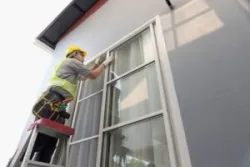
For busy business owners in Texas, commercial insurance stands as an indispensable safeguard, offering protection against the unpredictability of life and commerce. This form of insurance is crucial for businesses, covering a range of potential risks and damages that can significantly impact operations and financial stability. Among these risks, window damage emerges as a common concern, attributed to Texas’ susceptibility to severe weather events, such as hurricanes and hailstorms, as well as instances of vandalism in the country and the city alike.
The repercussions of such damages can extend beyond mere aesthetics, affecting a business’s security and operational efficiency. Navigating the intricacies of insurance claims in these scenarios can be daunting, highlighting the invaluable role of a commercial insurance claims lawyer in Corpus Christi. These professionals can fight for business owners as they try to claim the compensation needed to recover and thrive post-damage.
Why Is Commercial Insurance Helpful for Business Owners?
In Texas, commercial insurance serves as a critical tool for businesses seeking to mitigate a variety of risks associated with their operations. The landscape of commercial insurance in this state is diverse, offering several types of policies to address the unique needs of businesses across different industries. At its core, commercial insurance in Texas is designed to provide financial protection against unforeseen events that could have a detrimental impact on business continuity and financial health.
- Property insurance is one of the fundamental components of commercial coverage, safeguarding businesses against damage to their physical assets, including buildings, windows, equipment, and inventory. This type of insurance is particularly crucial in Texas, where properties are often exposed to severe weather conditions, such as tornadoes and hurricanes, which can cause extensive damage.
- Liability insurance, on the other hand, offers protection against claims resulting from injuries or damages that occur on business premises, or as a result of using goods or services sold by the business. This is essential for defending against lawsuits and legal claims, which can arise from various circumstances in the business environment.
- Business interruption insurance provides compensation for lost income and covers operating expenses when a business must temporarily cease operations due to a covered event, such as a natural disaster. This can be particularly valuable in Texas, where businesses may be prone to disruptions caused by extreme weather events.
Understanding these types of commercial insurance and how they apply to the specific risks faced by Texas businesses is crucial for owners and operators. It ensures not only the protection of physical and financial assets but also the long-term viability of the business itself.
We have offices in Houston, Corpus Christi, and Victoria; and will travel to any corner of Texas if we are capable of preventing an injustice.

Will Insurance Cover Broken Windows on My Commercial Property?
In commercial insurance, coverage for window damage is addressed through the lens of “covered perils,” which are specific events or risks explicitly mentioned in the policy. These perils often include natural disasters such as hurricanes and hailstorms, vandalism, and accidents. Understanding how these terms apply to window damage is crucial for businesses seeking to protect their physical assets effectively.
Commercial property insurance policies typically outline the types of window damage covered, with emphasis on the cause of the damage. For instance, if a window is shattered during a burglary attempt, the damage would likely be covered because vandalism and theft are commonly listed as covered perils. Similarly, windows damaged by hail or wind during a storm would also typically be covered, reflecting the policy’s provisions against weather-related incidents.
However, it’s important for businesses to review their policies closely, as some might require separate deductibles for specific types of damage or exclude certain perils altogether. For example, in areas prone to hurricanes, a policy might have a separate hurricane deductible or specifically exclude hurricane-related damage, necessitating additional coverage.
Scenarios where window damage would be covered include a tree branch breaking a window during a storm, an accidental collision by a company vehicle, or vandalism during a public disturbance. Each of these examples hinges on the damage being directly caused by a covered peril, underscoring the importance of understanding policy specifics to ensure comprehensive protection.
Specifics of Window Damage Coverage
Window damage coverage within commercial insurance policies distinguishes between accidental damage and wear and tear. Accidental damage refers to sudden and unexpected events that cause harm to windows, such as impacts from storms or vandalism. Conversely, wear and tear pertain to the gradual deterioration of windows over time due to normal usage and exposure to environmental factors; this type of damage is typically not covered because it’s considered a maintenance issue.
Deductibles play a crucial role in claims for window damage. A deductible is the amount the policyholder is responsible for paying out-of-pocket before the insurance coverage kicks in. For instance, if the cost to repair a window is $2,000 and the deductible is $500, the policyholder would pay the first $500, and the insurance would cover the remaining $1,500. Choosing a higher deductible can lower premium costs, but it increases the out-of-pocket expenses when a claim is made.
Policy limits are also vital, as they define the maximum amount an insurance company will pay for a covered claim. If the cost to repair or replace damaged windows exceeds the policy’s limit, the business owner would be responsible for the difference.
Representing the injured in all areas of Texas that extends back over 40 years

What Can a Lawyer Do When Making a Window Damage Claim?
A commercial insurance claims lawyer is an invaluable ally for businesses navigating the complexities of a window damage claim, especially in situations where the process stalls or the insurer’s response is unsatisfactory. These legal professionals specialize in dissecting policy language, ensuring that policyholders receive the full benefits entitled under their insurance contracts. In instances of wrongful denials, where an insurer refuses to cover a legitimate claim for window damage, a lawyer can challenge this decision, advocating for the business’s rightful compensation.
Moreover, when an insurer engages in bad faith practices—such as unnecessary delays in claim processing, failure to conduct a thorough investigation, or refusal to pay a claim without a reasonable basis—a commercial insurance claims lawyer can hold the insurer accountable. By pursuing bad faith claims, these lawyers not only seek to rectify the immediate issue of denied or underpaid claims but also aim to secure compensation for any additional damages inflicted on the business due to the insurer’s misconduct.
You need a skilled advocate to protect your legal rights and present your claim in such a way as to maximize your recovery.

File Your Window Damage Suit With Legal Help Today
Call Carrigan & Anderson, PLLC now for help. We can help you with your window damage claims, and any other commercial insurance claims today. We’re just phone call away.
At Carrigan & Anderson, PLLC we can talk to you about your options and rights.


